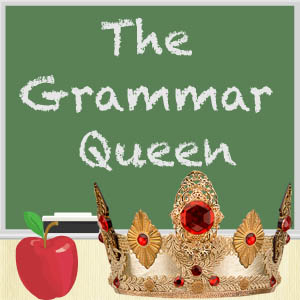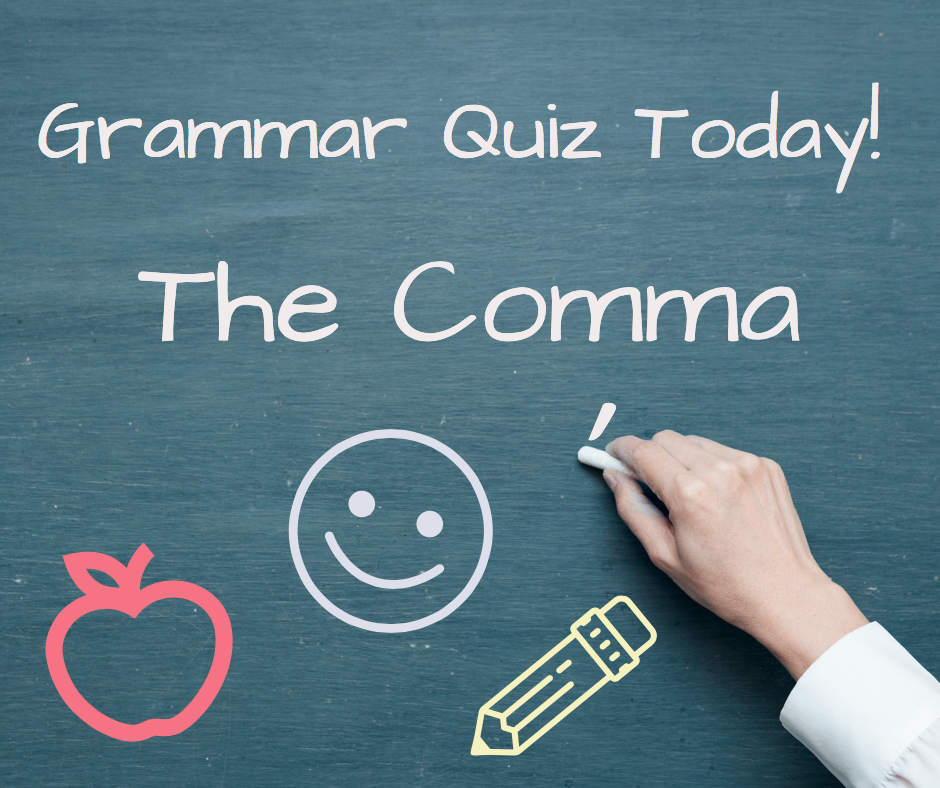 Greetings, class! I’m simply delighted Myra permitted me to return with another lecture. The first order of business, however, will be a pop quiz, because Grammar Queen really must assess your comma skills before the lecture begins. Please mark each of these sentences correct or incorrect, and be prepared to explain your reasons:
Greetings, class! I’m simply delighted Myra permitted me to return with another lecture. The first order of business, however, will be a pop quiz, because Grammar Queen really must assess your comma skills before the lecture begins. Please mark each of these sentences correct or incorrect, and be prepared to explain your reasons:
1. Charlotte visited the palace to see her cousins, the maid and the butler. [Hint: the maid and the butler are NOT Charlotte’s cousins.]
2. I’ve heard London, England can be quite foggy this time of year.
3. Myra is the author of many, published books.
4. August, 2008, is when my beloved hostess signed her very first book contract.
5. The pets, that share Myra’s home, shed entirely too much for Grammar Queen’s liking.
6. “Hello Sam,” Frodo said with a wave.
7. Two of my students unfortunately did not attend class and therefore failed the quiz.
8. Ben’s friend, Peter, is going fishing this weekend.
Well, class, how well do you think you performed on this quiz? Before we check your answers, here is what Anne Stilman has to say about the comma in her outstanding reference Grammatically Correct:
“The comma is by far the most-used punctuation mark, typically outnumbering all the others put together. Its basic role is to function as an interrupter, separating a sentence into distinct units.”
The Chicago Manual of Style describes the role of the comma even more succinctly:
“Effective use of the comma involves good judgment, with ease of reading the end in view.”
And now, grammar students, it’s time to check your quiz answers. I would suggest you exchange papers with a classmate for grading, but that might prove difficult under these classroom conditions. So Grammar Queen is trusting you to be fair and honest in checking your own work.
To simplify grading, let me begin by informing you that ANY sentence you marked as CORRECT is an automatic 10-point deduction.
Yes, class, you heard me. Every single sentence on this quiz demonstrated incorrect usage of the comma.
We will now discuss the applicable rules in each instance.
1. Charlotte visited the palace to see her cousins, the maid, and the butler.
For the purpose of clarity, the serial comma is necessary after “maid” to indicate Charlotte visited four or more individuals.
2. I’ve heard London, England, can be quite foggy this time of year.
Commas are required to set off the individual elements in addresses or place names. Therefore, a comma is required both before and after “England.”
3. Myra is the author of many published books.
When two or more adjectives precede a noun, the comma is NOT used if you cannot insert the word “and” between the adjectives and have the sentence still make sense. In this sentence we have removed the comma after “many.”
4. August 2008 is when my beloved hostess signed her very first book contract.
When a month and year only are given, no commas should be used. The commas before and after “2008” have been deleted. If using the month, day, and year, use commas as in this example: “Sunday, April 1, 2018, is the date for Easter this year.” Note that each element of the date is set off by commas.
5. The pets that share Myra’s home shed entirely too much for Grammar Queen’s liking.
“That share Myra’s home” is a restrictive phrase, necessary to identify whose pets we are discussing. Therefore, the phrase should NOT be set off by commas.
6. “Hello Sam,” Frodo said with a wave.
In any phrase containing a direct address, the person’s name should be set off by commas, wherever it appears in the phrase. Yes, Grammar Queen is sadly aware that in casual correspondence such as email, many of you simply type “Hi Sam” or Hello Frodo” and completely ignore the need for a comma. Grammar Queen abides such flagrant rule bending in limited cases, but she is of the firm opinion that we must and should follow such rules in manuscripts and professional correspondence. (You do want to make a good impression when it counts, do you not?)
7. Two of my students unfortunately did not attend class and therefore failed the quiz.
The word “unfortunately” is a parenthetical expression, which must, therefore, be set off by commas. Other parenthetical expressions may include therefore, however, indeed, and to say the least. However, when a word such as therefore is essential to the meaning of the sentence (as in our sentence example above), do NOT offset the word with commas.
8. Ben’s friend, Peter, is going fishing this weekend.
Must I explain that Peter is not Ben’s ONLY friend? “Peter” is used as an appositive in this sentence, and because it is restrictive (meaning the name identifies which of Ben’s MANY friends is going fishing), we do NOT use commas here.
On the other hand, when using a spouse’s name as in the following example, the commas are necessary: “Myra’s husband, Project Guy, was quite a catch!” The name in this instance is nonrestrictive, meaning (since we are certain Myra is not a bigamist) the name provides supplemental rather than essential information.
Though we have barely touched on the many aspects of correct comma usage, this concludes our lesson for today. However, should you have questions about anything comma related, Grammar Queen will do her best to provide answers.
If you are feeling brave, perhaps you would share your pop quiz scores in our comment section. If not, well, Grammar Queen can certainly understand your reluctance to expose your grammar skills to public scrutiny.
Do be aware, however, that as you busily post commentary willy-nilly across the internet, Grammar Queen may be watching! And remember, dears, the internet has a very long memory!
Post your questions and comments below, or feel free to send them to me personally using this comment form.
You can also follow Grammar Queen on Twitter!

